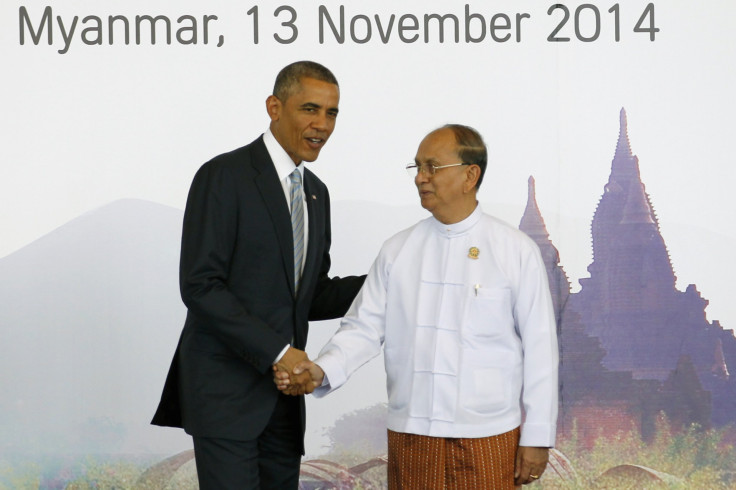Why Myanmar, Not Burma: 5 Key Facts Amid Obama's East Asia Summit Visit

U.S. President Barack Obama is in Myanmar this week to attend the annual East Asia Summit and to push Myanmar to address its human rights issues and return to a path of social and political change. After nearly 50 years under military rule, Myanmar is finally open to the world and everybody wants to get in on it. Here’s what you need to know about the formerly reclusive country.
It’s Myanmar, not Burma: The official name of the country is the Republic of the Union of Myanmar, which was adopted in 1989, partly as one of a number of concessions over pro-democracy protests. It was known as Burma prior, both during its British colonial period and after the military took over in 1962. The name Burma is one iteration in a series of adaptations of the name Bama, the largest ethnic group in the country. It was considered a slight towards the dozens of other minorities living there. The name Myanmar dates from sometime in the 13th century, but there’s debate over whether it's actually more inclusive and representative of all of Myanmar’s ethnic groups or even more ignorant of the country’s history and culture.
Most news agencies use Myanmar and sometimes follow it with “formerly Burma,” but there’s still some governments and organizations that prefer Burma. For example, if you asked your iPhone what time it was in Myanmar’s biggest city, Yangon, you’d have to ask for Yangon, Burma.
AP Style tip: Myanmar is the name for the country and the language. See more: http://t.co/T7bGzl2r3w
— AP Stylebook (@APStylebook) April 1, 2013Myanmar is a fledging democracy: Starting in 2010, the ruling military junta began a series of reforms to democratize Myanmar and open the country up economically. Elections largely considered flawed because of reports of voter fraud and intimidation eventually named Thein Sein, a military man and former prime minister, the president of Myanmar. Despite a questionable rise to power, Thein Sein led the country into a reformation period. Nobel laureate Aung San Suu Kyi was released after nearly 20 years of on-and-off house arrest, political prisoners were released from jail, money flowed in and some independent media was allowed to work. The progress has garnered cautious international praise and Myanmar even won the chair of the ASEAN organization this year, which is why it is hosting the East Asia Summit.
Myanmar has a human rights problems: Progress has slowed since 2010. The systematic persecution of the Muslim Rohingya minority group has tarnished the supposed era of progress and become a major point of contention during the East Asia Summit. There are about 800,000 Rohingya living in Myanmar and they are violently hated by most other ethnic groups in the country. They are considered one of the most persecuted ethnic groups in the world, so much so that in April, the United Nation’s special rapporteur for human rights in Myanmar said their treatment in Myanmar’s Rakhine State “could amount to crimes against humanity.” Thousands have fled and died trying to reach surrounding countries, and the international community has called on the government to do more to protect them.
Obama is expected to bring up the Rohingya's dire situation with Thein Sein, but only time will tell if Obama's words have any effect, especially after Obama told local media Wednesday there were “some step backwards” in the country since the reform period started.
Press freedoms were touted as a main focus of improvement by the government, but press suppression continues in 2014. Less than a month ago, a group of journalists and their publisher were sentenced to two years in prison for publishing “statements that could cause public alarm.” Reporters Without Borders ranked Myanmar the 35th worst country for press freedoms in 2014 on their annual press freedom index.
Obama has visited Myanmar twice in two years: He arrived in Myanmar Wednesday for the East Asia Summit, but he has a special connection with the country. He became the first U.S. president to visit Myanmar when he flew to meet Thein Sein in 2012. Helping Myanmar back into the global scene and establishing the U.S. as a strong partner was one of Obama’s biggest foreign policy goals of his first term as president. At the time his administration touted its work there, but now after a couple years of stalled progress, Obama has put the pressure back on Thein Sein and his government to step it up. If he wants to walk away from the White House known as “America’s first Pacific president,” he’ll need to secure some long-lasting change in Myanmar and get America’s foot in the economic door before it closes.
The 2015 general elections will be the biggest test of Myanmar’s progress during the transitional period: The government insists it will be free and democratic, but the nation’s most popular politician, Suu Kyi, is barred from running for president because of a constitutional amendment that blocks anyone with children that are foreign nationals from running for president. The law was made under military rule, likely with her in mind, alongside a rule that reserves a quarter of the seats in parliament for the military. When given the chance in 1990 and in the 2012 by-elections, Myanmar’s voters have overwhelmingly supported Suu Kyi’s party, the National League for Democracy. If Suu Kyi is allowed to run, she’ll likely win the presidency, meaning Myanmar is on track for true reform. How the press is handled and how the Rohingya are treated are also major indicators of how committed the government is to bringing Myanmar into the 21st century over the next few years.
© Copyright IBTimes 2024. All rights reserved.






















